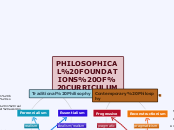PHILOSOPHICAL FOUNDATIONS OF CURRICULUM
Traditional Philisophy
Perrennialism
realism
Educate rational person
Essentialism
idealism/realism
Intellectual growth. 3 R's
Contemporary Philosphy
Progressive
pragmatic
Democratic social living
Reconstructionism
pragmaticism
Improved society
CURRICULUM DESIGN
Representative
Curriculum
Designs
Subject-Centred Designs (Ornstein & Hunkins, 2013);
Subject Matter Designs (Sowell, 2005)
Subject Design
Discipline Design
Broad-Fields Design
Correlation Design
Process Designs
Learner-Centred Designs (Ornstein & Hunkins, 2013);
Learner-Based Designs (Sowell, 2005)
Child-Centred Design
Experience-Centred Design
Romantic (Radical) Design
Humanist Design
Problem-Centred Designs (Ornstein & Hunkins, 2013);
Society-Culture-Based Designs (Sowell, 2005)
Life Situations Design
Reconstructionist Design
Shadow Curricula
Operational Curriculum
Hidden Curriculum
Null Curriculum
Design Dimension Considerations
Scope
Sequence
Continuity
Articulation
Integration
Balance
CONCEPTIONS OF CURRICULUM
ACADEMIA
(Al-Mousa, 2013)
Academic
Rationalist
Traditionalist
INDIVIDUAL
(Al-Mousa, 2013)
Humanist
Self-actualization
Learner-centered
SOCIETY
(Al-Mousa, 2013)
Social
Reconstructionist-
Relevance
TECHNOLOGY
(Al-Mousa, 2013)
Cognitive
Processes
Systemic
THEORISTS
Marsh and Willis
Critical explanatory
Look at curriculum from both an intellectual and social analysis
Descriptive/Critical Exploratory
Look at curriculum in real time and adjust accordingly
Prescriptive
Focused on end, objectives, and outcomes
Eisner and Vallance
Social reconstructivism
Societal needs over individual needs
Curriculum of Technology
Focuses on process
Academic rationalism
Most traditional. Classic Disciplines
Self-actualization
Discover things on their own
Development of Cognitive Process
McNeil
Humanistic
Individualism
Social Reconstruction
Social change
Systemic or technology
Process is more important
Academic
Developing the rational mind
Pratt
Individual fulliment
Learning through personal experience
Social Tranformation
Political and social change
Cultural Transmission
Traditional academic knowledge
Sowell
Self-Actualization
Needs of the individual
Social-relevance reconstruction
Needs of society and culture
Technology
Learners systematic and efficient through process
Cumulative tradition of organized knowledge
Traditional knowledge based on subjects
Vallance
Personal success and commitment
Individual needs
Social reconstruction
Improve society
Technology
Process for the greatest benefit to the most students
Academic rationalism
Create intellectuals with a broad scope of knowledge
